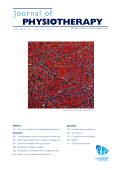
Foot & Ankle
Self-dosed and pre-determined heavy-slow exercise provide similar PROMs for plantar fasciopathy
J Physiother. 2019 Jul;65(3):144-151.70 patients with plantar fasciopathy were randomized to receive a self-dosed or pre-determined heavy-slow resistance exercise treatment program. The primary outcome of interest was the Foot Health Status Questionnaire (FHSQ) pain score. Secondary outcomes of interest included FHSQ function, footwear, and general health scores, the Global Rating of Change, plantar fascia thickness, exercise compliance, the Pain Self-Efficacy Questionnaire, the Patient Acceptable Symptom State, and the International Physical Activity Questionnaire (IPAQ, short version). Follow up was performed at 4 and 12 weeks post-operation. Results revealed no significant differences in all outcomes except FHSQ footwear at 12 weeks and IPAQ walking at 4 weeks, which were significantly in favour of the pre-determined group.
Unlock the full article
Get unlimited access to OrthoEvidence with a free trial
Start TrialCritical appraisals of the latest, high-impact randomized controlled trials and systematic reviews in orthopaedics
Access to OrthoEvidence podcast content, including collaborations with the Journal of Bone and Joint Surgery, interviews with internationally recognized surgeons, and roundtable discussions on orthopaedic news and topics
Subscription to The Pulse, a twice-weekly evidence-based newsletter designed to help you make better clinical decisions
Exclusive access to original content articles, including in-house systematic reviews, and articles on health research methods and hot orthopaedic topics
Or continue reading this full article
Register Now

Subscribe to "The Pulse"
Evidence-Based Orthopaedics direct to your inbox.




































